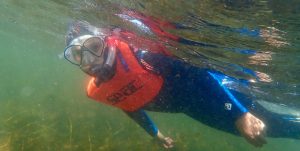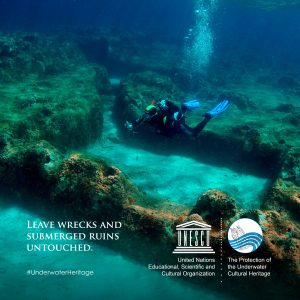

Responsible Diving
While exploring our marine environment, in order to minimise the risk of harming yourself or marine biodiversity and heritage, please remember to practice the principles of safe and responsible diving
Safe Diving
In order to minimise the risk of harm to yourself or your buddy, please remember to practice the principles of safe and responsible diving which apply before, during and after your dive or snorkel.
Divers are encouraged to follow safe diving practises, as outlined by the British Sub Aqua Club (BSAC), the national governing body for scuba diving and snorkelling in the UK, and PADI:
PADI Standard Safe Diving Practises Statement
Divers MUST have adequate diving qualifications, issued by an accredited diving organisation, in order to dive. Divers must also have experience/training in cold or temperate waters prior to exploring any of the DiveNI sites.
Safe Snorkelling
All snorkellers must have strong swimming abilities, adequate safety gear (i.e. wetsuit, buoyancy aid and a tow bag) and experience/training in cold or temperate waters before exploring any of the DiveNI sites. See guidelines for safe snorkelling:
BSAC Stay Safe When Snorkelling in the UK
Rockpool and Snorkelling Guide

Environmentally Responsible Diving
Our marine communities are fragile and already under so much strain from climate change, marine plastics and other anthropogenic activities.
While diving or snorkelling, please remember to practise the principles of environmentally responsible diving and ‘Leave No Trace’.
Diving and snorkelling specific guidelines are available from BSAC, PADI and Project Aware:
BSAC Diving Environmental Guidelines
PADI Responsible Marine Life Interactions
See the Marine Protected Areas page for guidance on diving within designated sites for nature conservation.
Respect Our Wrecks
Divers and snorkellers are encouraged to follow UNESCO’s Code of Ethics for Diving on Underwater Cultural Heritage Sites and the BSAC, PADI and SSA’s Respect Our Wrecks Code of Practice

Underwater Finds
Historical material found in the sea is an important part of our cultural inheritance and we all have a responsibility to conserve that inheritance for future generations.
The Joint Nautical Archaeology Policy Committee, the British Sub-Aqua Club, the Professional Association of Diving Instructors and the Sub Aqua Association have Guidance for Divers for underwater finds.
If you do intend to recover any objects of historic interest from the seabed using a vessel, vehicle, structure or floating container (including lifting bags), you should enquire with DAERA’s Marine Licensing team as to whether a Marine Licence is required.
Under the Merchant Shipping Act 1995 all wreck material found in the sea or on the shore must be reported to the Receiver of Wreck based in the Maritime and Coastguard Agency.
New discoveries of underwater finds can also be reported through the Marine Antiquities Scheme (MAS) – see Record Heritage
Site Access
Access to some sites may occur on private land and will depend on permission from the landowner.
Divers and snorkellers must follow The Access to the Countryside (Northern Ireland) Order 1983 and seek permission from the landowners prior to entering private land.
Divers and snorkellers should follow the principles of ‘Leave No Trace’ while on land before or after their dive/snorkel. These include proper disposal of waste and maintaining a safe distance from wildlife.






